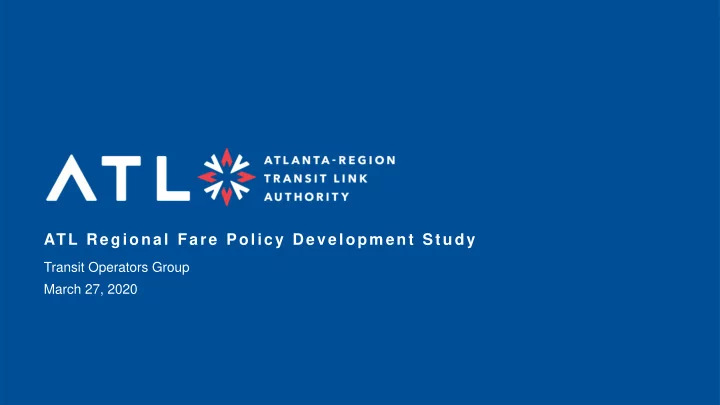

ATL Regional Fare Policy Development Study Transit Operators Group March 27, 2020
FARE POLICY OVERVIEW What is a Regional Fare Policy? “ Source: MARTA To establish guidelines for setting a uniform , fair , and equitable areawide fare structure consistent with revenue-producing ” requirements and established budgets. Source: SRTA Board Policy No. 29, San Diego Association of Governments (SANDAG) Source: WABE
WHY DEVELOP A REGIONAL FARE POLICY? For the ATL Vision For the Operator For the Customer ▪ One card fits all ▪ Develop a seamless ▪ Unified fare payment regional network system ▪ Consistent fare ▪ Ensure legislatively- ▪ Automated trip cost structure mandated farebox sharing ▪ Ease of transfer recovery rate for ▪ Administrative cost between providers transit operations savings ▪ Seamless connections ▪ Enhance regional ▪ One voice marketing across jurisdictional equity in fare structure REGIONAL boundaries and collection approach FARE POLICY BENEFITS
FARE POLICY COMPONENTS Transit Agency Background Fare Structure and Reviews Technology Evaluation 1 2 Regional Fare Policy Study 4 3 Stakeholder Engagement Title VI Fare Equity Analysis
FARE POLICY COMPONENTS Transit Agency Background Fare Structure and Reviews Technology Evaluation 1 ▪ Understand existing fare ▪ Brainstorm potential fare 2 structures of local structure options and agencies and how they scenarios interact Regional ▪ Determine customer Fare Policy ▪ Research fare structures elasticity within Atlanta Study of nationwide peer region agencies, including best ▪ Develop fare model and practices run scenarios ▪ Compile relevant ▪ Evaluate impacts to evaluation criteria for potential fare policies ridership and revenue streams
FARE POLICY COMPONENTS Title VI Fare Equity Analysis Stakeholder Engagement ▪ Investigate potential impacts and disparate ▪ Seek input from local burdens to minority, low- transit operators income, and/or Limited throughout the evaluation English Proficient (LEP) Regional process persons Fare Policy Study ▪ Coordinate with ATL ▪ Recommend measures 4 Board and Committees to mitigate potential throughout the process disproportionate impacts 3 ▪ Targeted outreach to these groups
TRANSIT OPERATOR GROUP INVOLVEMENT IS CRITICAL Formation of Regional Fare Policy Task Force ➢ Representatives from each agency serve as a liaison between ATL and respective agency ➢ Participate in Background Review Interviews ➢ Provide inputs for development of Evaluation Criteria ➢ Participate in workshops Background Reviews Evaluation Criteria ▪ Based on inputs from representatives of local ▪ Review existing fare systems and policy in local transit agencies region to build understanding of local environment ▪ Used to evaluate fare policy/structure options ▪ National agencies to determine best practices and approaches
NEXT STEPS ATL Project Team Regional Fare Policy Task Force ➢ Confirm representatives from each agency ➢ Complete on-line and national agency background research ➢ Validate background research ➢ Schedule interviews with Regional Fare ➢ Participate in interviews Collection Task Force members and national transit agency representatives ➢ Attend Workshops • ➢ Schedule workshops Provide feedback • Provide inputs for evaluation criteria 1 st Workshop to present draft findings, • ➢ Communicate with individual agency receive feedback, and get inputs for executive management evaluation criteria 2 nd Workshop to present final findings and • finalize evaluation criteria
Fare Concept and Evaluation FARE POLICY STUDY TIMELINE Memorandum PHASE I PHASE I March April May June July August Project Kick-Off Transit Provider Document existing policy Workshops structure Finalize evaluation criteria 2020 2021 PHASE II September October November December January February March Title VI Analysis Build scenarios and Determine customer elasticity run fare model values Final Recommendations Report
Recommend
More recommend